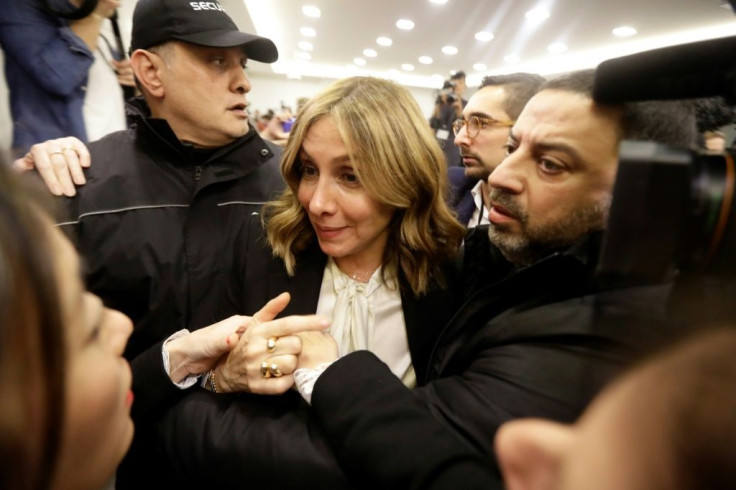Main Points Of Carlos Ghosn's Press Conference

Fugitive ex-Nissan boss Carlos Ghosn mounted a feisty defence Wednesday in Beirut, where he made his first public appearance since skipping bail in Japan 10 days ago.
He skirted the conditions of his escape but tackled most questions during a news conference that lasted more than two hours. Herewith the main points:
Media outlets have reported a variety of colourful details about his escape from bail, including how he had boarded a bullet train, hid in a box and switched private jets on his way to Lebanon.
"I will not talk about how I managed to leave Japan," he said, refusing to reveal the details of his Houdini act.
He stopped short of answering when he was asked: "Can you recommend a travel case as a means of travel?"
The former Renault-Nissan boss said he wanted to clear his name and felt he had "no choice" but to escape, because he had been "presumed guilty" in Japan, whose judiciary he said was "rigged".
Ghosn said he decided to escape "when I lost any hope of a fair trial and when I noticed the trial constantly postponed".
He said it had become clear he risked remaining in Japan for five years before a verdict was handed down.
"I am innocent of all the charges... I left Japan because I wanted justice," said Ghosn, who was arrested in November 2018 and faces several counts of financial misconduct.
"I felt I was a hostage of a country that I served for 17 years," Ghosn explained, adding that the other main reason for attempting an escape was that he missed his wife.
There was "no sign of removing the ban from seeing my wife," he said.
Describing conditions in his detention cell in Japan, he said: "130 days in prison, solitary confinement, a tiny cell without windows, lights (on) day and night."
He said he was "interrogated day and night... up to 8 hours, obviously without the presence of a lawyer".
He was allowed to shower only twice a week, and could go out for 30 minutes a day, except on weekends.
Ghosn claimed that the automotive alliance's economic performance had tanked since his arrest and piled scorn on his successors.
"It is difficult to say who is the winner of this," he said of the 13-month-old judicial saga. "In 2017 the alliance was the number one automotive group... growing, profitable, with a clear vision for the future."
He said the alliance was now all but dead and marvelled at how Nissan-Renault failed to follow through with a once much-anticipated merger with Fiat Chrysler.

"The alliance missed the unmissable," he said. "It's unbelievable that this didn't happen."
He claimed that Nissan had been losing $40 million a day since his arrest and Renault around $20 million.
When asked what he would do to boost the ailing auto alliance, he said: "What I would do is completely different from what's being done."
Ghosn spoke of his ordeal and how not seeing his wife in Japan was a key reason for escaping.
"I received my sister, my kids, my friends but not my wife. Why? Because they wanted to break me," he said. "I felt like I was not human anymore... I have to explain why I want to talk with my wife."
"Maybe for a lot of people it would have been not a punishment not to see their wife, but for me it was," he joked.
Fielding questions from journalists, he defended the parties thrown at the Versailles castle, arguing that foreigners are "dazzled by Versailles".
On the party that was held for the alliance's 15th anniversary and that also coincided with his own birthday, he stressed it was a corporate function and the setting was selected because it embodied a French genius and is attractive to foreigners.
"It's not because we want to mimic Louis XIV or mimic Marie-Antoinette," he said.
Ghosn sought to counter the image of a ruthless tyrant conferred on him by some -- mostly Japanese -- media outlets since his arrest.
"In a minute, I was a cold, greedy dictator... a kind of mercenary: I was here for the money," he said.
"I like Japan, I like the people," Ghosn said, who went on to list his achievements and defend his commitment to the country where he spent nearly two decades.
"I revived Nissan," he said. "After the tsunami, I was the first foreigner to return to Japan," he claimed.
Answering speculation in Lebanon that he might be a good fit as finance minister, or even Central Bank governor, he said he did not plan to enter politics.
"I'm not a politician, I have no political ambition," he said, adding however that he was ready to offer his experience and advice if he was asked to.
Slapped with an Interpol "red notice" requested by Japan, Ghosn said he was "ready to stay in Lebanon".
He also hinted that his news conference was only the beginning of a long process during which he will bring forward evidence of his innocence.
© Copyright AFP 2024. All rights reserved.




















